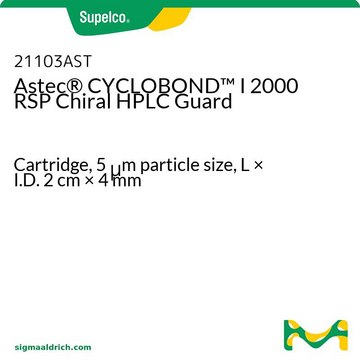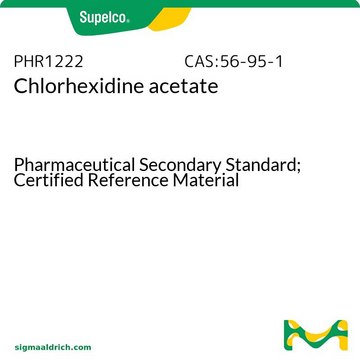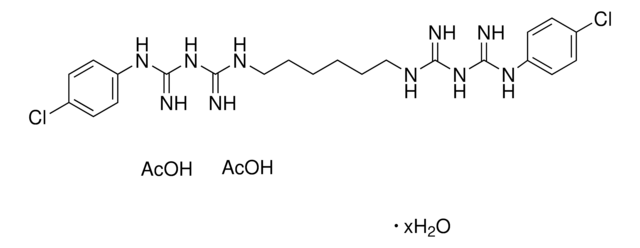282227
Chlorhexidine
≥99.5%
Synonym(s):
1,1′-Hexamethylenebis[5-(4-chlorophenyl)biguanide]
About This Item
Recommended Products
Assay
≥99.5%
form
powder
impurities
<1.0% water
mp
134-136 °C (lit.)
solubility
water: soluble 0.08% at 20 °C
SMILES string
Clc1ccc(NC(=N)NC(=N)NCCCCCCNC(=N)NC(=N)Nc2ccc(Cl)cc2)cc1
InChI
1S/C22H30Cl2N10/c23-15-5-9-17(10-6-15)31-21(27)33-19(25)29-13-3-1-2-4-14-30-20(26)34-22(28)32-18-11-7-16(24)8-12-18/h5-12H,1-4,13-14H2,(H5,25,27,29,31,33)(H5,26,28,30,32,34)
InChI key
GHXZTYHSJHQHIJ-UHFFFAOYSA-N
Looking for similar products? Visit Product Comparison Guide
General description
Chlorhexidine is a cationic surfactant with broad-spectrum antimicrobial activity. It is used as a disinfectant in periodontal therapy and surgical scrubs.
Application
Signal Word
Danger
Hazard Statements
Precautionary Statements
Hazard Classifications
Aquatic Acute 1 - Aquatic Chronic 1 - Eye Dam. 1
Storage Class Code
11 - Combustible Solids
WGK
WGK 3
Personal Protective Equipment
Certificates of Analysis (COA)
Search for Certificates of Analysis (COA) by entering the products Lot/Batch Number. Lot and Batch Numbers can be found on a product’s label following the words ‘Lot’ or ‘Batch’.
Already Own This Product?
Find documentation for the products that you have recently purchased in the Document Library.
Customers Also Viewed
Our team of scientists has experience in all areas of research including Life Science, Material Science, Chemical Synthesis, Chromatography, Analytical and many others.
Contact Technical Service








![Imidazo[1,2-a]pyridine-7-carboxylic acid AldrichCPR](/deepweb/assets/sigmaaldrich/product/structures/307/298/b27c0495-0260-443a-9af3-d106cfb691a6/640/b27c0495-0260-443a-9af3-d106cfb691a6.png)